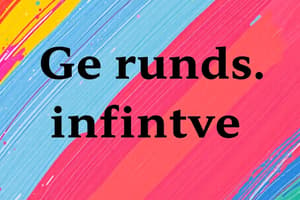Podcast
Questions and Answers
Which sentence correctly uses a verb followed by a gerund?
Which sentence correctly uses a verb followed by a gerund?
- They plan to go to Italy next year.
- He avoids eating junk food. (correct)
- She enjoys to swim in the ocean.
- We hope going to the party.
In which sentence is the infinitive used correctly?
In which sentence is the infinitive used correctly?
- He offered to help with the project. (correct)
- She decided going to the concert.
- They miss to play soccer.
- I want studying abroad next semester.
Identify the sentence with a correctly used gerund phrase.
Identify the sentence with a correctly used gerund phrase.
- She is considering moving to another city. (correct)
- Running in the morning its good exercise.
- He likes to play the guitar.
- To read books is my favorite hobby.
Which sentence demonstrates the correct use of an infinitive phrase acting as an adjective?
Which sentence demonstrates the correct use of an infinitive phrase acting as an adjective?
The verbs 'begin', 'continue', and 'start' can be followed by either a gerund or an infinitive without a significant change in meaning.
The verbs 'begin', 'continue', and 'start' can be followed by either a gerund or an infinitive without a significant change in meaning.
Which sentence implies that the action of turning off the lights was completed but is now forgotten?
Which sentence implies that the action of turning off the lights was completed but is now forgotten?
Choose the sentence where 'remember' implies recalling a past event.
Choose the sentence where 'remember' implies recalling a past event.
In which sentence does 'regret' introduce bad news?
In which sentence does 'regret' introduce bad news?
Which sentence implies quitting a habit?
Which sentence implies quitting a habit?
She is considering ______ (move) to another city to pursue her career.
She is considering ______ (move) to another city to pursue her career.
They decided ______ (go) to the beach for their vacation.
They decided ______ (go) to the beach for their vacation.
Provide a sentence using 'enjoy' followed by a gerund.
Provide a sentence using 'enjoy' followed by a gerund.
Write a sentence using 'want' followed by an infinitive.
Write a sentence using 'want' followed by an infinitive.
An infinitive phrase can function as a noun, adjective, or adverb in a sentence.
An infinitive phrase can function as a noun, adjective, or adverb in a sentence.
Match the verb with the correct form that typically follows it:
Match the verb with the correct form that typically follows it:
Which of the following sentences shows the correct usage of a gerund?
Which of the following sentences shows the correct usage of a gerund?
Which sentence correctly uses an infinitive phrase as a noun?
Which sentence correctly uses an infinitive phrase as a noun?
The sentence "I stopped to eat." implies the same thing as "I stopped eating."
The sentence "I stopped to eat." implies the same thing as "I stopped eating."
Which of the following sentences shows the correct usage of a verb followed by an infinitive?
Which of the following sentences shows the correct usage of a verb followed by an infinitive?
Which sentence indicates that the speaker forgot to perform an action?
Which sentence indicates that the speaker forgot to perform an action?
Flashcards
What is a gerund?
What is a gerund?
A verb form ending in '-ing' that functions as a noun.
What is an infinitive?
What is an infinitive?
The base form of a verb preceded by 'to'.
What are 'gerund verbs'?
What are 'gerund verbs'?
Verbs that are consistently followed by gerunds.
Enjoy (gerund verb)
Enjoy (gerund verb)
Signup and view all the flashcards
Avoid (gerund verb)
Avoid (gerund verb)
Signup and view all the flashcards
What are 'infinitive verbs'?
What are 'infinitive verbs'?
Signup and view all the flashcards
Hope (infinitive verb)
Hope (infinitive verb)
Signup and view all the flashcards
Decide (infinitive verb)
Decide (infinitive verb)
Signup and view all the flashcards
What is a gerund phrase?
What is a gerund phrase?
Signup and view all the flashcards
What is an infinitive phrase?
What is an infinitive phrase?
Signup and view all the flashcards
'Forget to do' meaning
'Forget to do' meaning
Signup and view all the flashcards
'Forget doing' meaning
'Forget doing' meaning
Signup and view all the flashcards
'Remember doing' meaning
'Remember doing' meaning
Signup and view all the flashcards
'Remember to do' meaning
'Remember to do' meaning
Signup and view all the flashcards
'Regret doing' meaning
'Regret doing' meaning
Signup and view all the flashcards
'Regret to say' meaning
'Regret to say' meaning
Signup and view all the flashcards
'Stop doing' meaning
'Stop doing' meaning
Signup and view all the flashcards
'Stop to do' meaning
'Stop to do' meaning
Signup and view all the flashcards
Study Notes
- Gerunds and infinitives are verb forms that act as nouns.
- Gerunds are verbs ending in "-ing" that function as nouns.
- Infinitives are the base form of a verb preceded by "to."
Verbs Followed By Gerunds
- Some verbs are consistently followed by gerunds.
- Examples of such verbs include: admit, appreciate, avoid, complete, consider, continue, delay, deny, detest, dislike, enjoy, escape, finish, imagine, involve, keep, mind, miss, postpone, practice, quit, recall, recommend, resent, resist, risk, suggest, tolerate, and understand.
- Example: "I enjoy reading novels." ("reading" is a gerund)
- Example: "She avoided answering the question." ("answering" is a gerund)
Verbs Followed By Infinitives
- Certain verbs are typically followed by infinitives.
- Common verbs in this category are: agree, appear, arrange, ask, attempt, claim, decide, demand, deserve, expect, fail, forget, hesitate, hope, learn, manage, mean, need, offer, plan, prepare, pretend, promise, refuse, seem, tend, threaten, want, and wish.
- Example: "They decided to go to the beach." ("to go" is an infinitive)
- Example: "He wants to learn Spanish." ("to learn" is an infinitive)
Gerund Phrases
- A gerund phrase consists of a gerund and any modifiers or complements.
- The entire phrase acts as a noun.
- Example: "Reading books is my favorite hobby." ("Reading books" is the gerund phrase)
- Example: "She is good at playing the piano." ("playing the piano" is the gerund phrase)
Infinitive Phrases
- An infinitive phrase includes an infinitive and any modifiers or complements.
- The entire phrase functions as a noun, adjective, or adverb.
- Example (noun): "To travel the world is my dream." ("To travel the world" is the infinitive phrase acting as a noun/subject)
- Example (adjective): "I need a pen to write the letter." ("to write the letter" is the infinitive phrase modifying "pen")
- Example (adverb): "He studied hard to pass the exam." ("to pass the exam" is the infinitive phrase modifying "studied")
Gerund vs Infinitive
- Some verbs can be followed by either a gerund or an infinitive, sometimes with a change in meaning.
- Verbs with little to no change in meaning include: begin, continue, hate, like, love, prefer, and start.
- Example: "I like swimming" and "I like to swim" have similar meanings.
- Verbs with a change in meaning include: forget, remember, regret, and stop.
- "Forget"
- "I forgot turning off the lights" (implies that the action was completed, but it's forgotten)
- "I forgot to turn off the lights" (implies that the action was not completed)
- "Remember"
- "I remember meeting him" (implies recalling a past event)
- "I remembered to meet him" (implies remembering an obligation)
- "Regret"
- "I regret saying that" (implies feeling sorry about something already said)
- "I regret to say that" (introduces bad news)
- "Stop"
- "I stopped smoking" (implies quitting the habit)
- "I stopped to smoke" (implies pausing an activity to smoke)
Studying That Suits You
Use AI to generate personalized quizzes and flashcards to suit your learning preferences.





